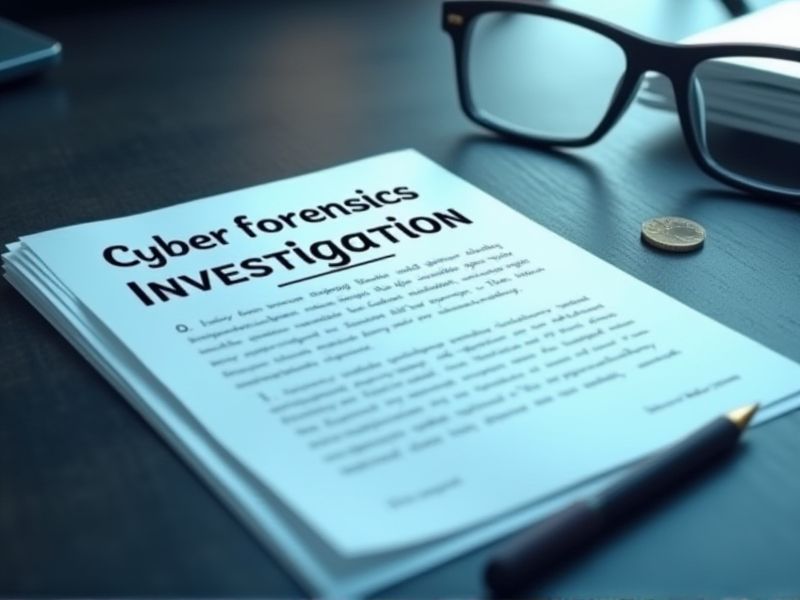
Cyber Forensics Investigators analyze digital evidence to uncover cyber crimes, requiring a deep understanding of advanced technologies. Certain certifications ensure they possess the necessary skills and knowledge to handle complex cases effectively. These credentials often validate expertise in areas like digital analysis, network security, and ethical hacking. Key certifications for a Cyber Forensics Investigator include those that demonstrate proficiency in these critical skills.
Certified Computer Examiner (CCE)
Certified Computer Examiners (CCEs) possess specialized skills crucial for analyzing digital evidence in cyber forensic investigations. Their certification ensures adherence to rigorous standards and methodologies, which is vital for maintaining the integrity of the evidence in court. The credibility of a CCE can significantly strengthen prosecutorial cases by providing reliable and unbiased digital analysis. In a rapidly evolving technological landscape, CCEs stay updated with the latest tools and techniques, enhancing their effectiveness in cyber forensics.
Certified Forensic Computer Examiner (CFCE)
The CFCE certification provides comprehensive training in digital evidence analysis, equipping investigators with specialized skills essential for uncovering digital crimes. The certification ensures adherence to legal and ethical standards, crucial for maintaining the integrity and admissibility of evidence in court. Cyber threats and crimes continue to evolve, demanding a high level of expertise and up-to-date knowledge that CFCE ensures. Organizations prioritize hiring CFCE-certified professionals to safeguard their data and systems against increasingly sophisticated cyber threats.
GIAC Certified Forensic Analyst (GCFA)
The GIAC Certified Forensic Analyst (GCFA) credential is vital for a Cyber Forensics Investigator because it validates advanced knowledge in digital forensics and incident response. With cyber threats becoming increasingly sophisticated, an investigator with GCFA certification demonstrates proficiency in analyzing complex system artifacts and understanding threat vectors. The certification equips professionals with the skills necessary for performing detailed forensic investigations and handling volatile data effectively. Organizations value this certification as it ensures that investigations are conducted accurately, aiding in legal compliance and strengthening cybersecurity posture.
GIAC Certified Forensic Examiner (GCFE)
The GIAC Certified Forensic Examiner (GCFE) certification is needed for a Cyber Forensics Investigator because it ensures proficiency in conducting thorough digital investigations. This certification validates the investigator's ability to analyze various forms of digital evidence effectively, which is crucial in solving complex cybercrimes. Employers often seek professionals with this certification to ensure they have the technical skills required to handle incidents involving computer forensics. The GCFE credential helps investigators stay updated with current forensic techniques and industry standards, which is vital in the rapidly evolving field of cybersecurity.
EnCase Certified Examiner (EnCE)
Obtaining the EnCase Certified Examiner (EnCE) credential enhances a cyber forensics investigator's technical proficiency since EnCase is a widely-utilized forensic software tool. Investigators with EnCE certification are often trusted more in legal settings, as this credential validates their skill in handling digital evidence. EnCE certification can lead to better career opportunities because employers recognize the rigorous examination process involved. The certification ensures that investigators can consistently apply best practices in forensic procedures, which is crucial in maintaining the integrity of evidence.
Certified Cyber Forensics Professional (CCFP)
The demand for Certified Cyber Forensics Professionals (CCFP) arises from the complex nature of digital crimes, requiring specialized skills to analyze and interpret electronic evidence. Organizations facing cyber threats need professionals who can efficiently identify security breaches and gather legally admissible data, which the CCFP certification ensures. Cyber Forensics Investigators with CCFP credentials have demonstrated a comprehensive understanding of both technical and legal aspects of cyber investigations, enhancing their ability to support legal proceedings. As cybercrime continues to evolve, the CCFP certification remains paramount for investigators to stay updated with industry-standard practices and methodologies.
AccessData Certified Examiner (ACE)
AccessData Certified Examiner (ACE) is needed for Cyber Forensics Investigators because it validates their expertise in using AccessData's suite of tools for digital investigations. This certification ensures investigators can efficiently analyze digital evidence, crucial for solving cases involving cybercrime. Having ACE certification also boosts the credibility of forensic reports in legal proceedings by demonstrating adherence to standardized procedures. As cyber threats evolve, possessing verified skills in current forensic software becomes imperative for maintaining investigation effectiveness.
Certified Forensic Investigator (CFI)
The increasing complexity of cybercrime requires expertise that a Certified Forensic Investigator (CFI) offers, which ensures thorough understanding of digital evidence handling. Legal proceedings often demand that evidence is collected and presented by certified professionals, making CFIs essential for credibility in court. The evolving nature of technology necessitates continuous learning, which CFIs are mandated to pursue, keeping them updated with the latest forensic techniques. Businesses facing data breaches or cyber attacks prefer CFIs because their certification signifies a standardized, high level of competence.
EC-Council Certified Forensic Analyst (ECFA)
The EC-Council Certified Forensic Analyst (ECFA) certification equips cyber forensics investigators with advanced skills to analyze and interpret digital evidence. This certification helps professionals stay updated with the latest forensic methodologies and tools, enhancing their investigative capabilities. Having ECFA certification boosts credibility, increasing trust and recognition within the cybersecurity field. Employers prefer candidates with ECFA as it demonstrates a commitment to maintaining high professional standards in digital forensics.
Certified Information Systems Security Professional (CISSP)
The CISSP certification provides a comprehensive understanding of various security practices, which is crucial for effective cyber forensics investigations. Having a CISSP ensures that the investigator is knowledgeable in identifying vulnerabilities and implementing security measures to prevent data breaches. Employers and clients often trust professionals with a CISSP, as it signifies a high standard of expertise in cybersecurity. The certification covers essential areas such as risk management, which directly impacts the ability to assess and mitigate threats during forensic investigations.
Summary
With certifications, you enhance your credibility and expertise in cyber forensics, making you more attractive to employers. It increases your chances for career advancement and higher salaries. Certified skills improve your ability to effectively investigate cybercrimes and digital evidence. You're better equipped to stay updated with industry trends and cybersecurity best practices.
